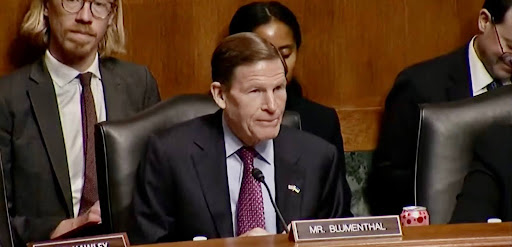WASHINGTON — As the Presidential elections are approaching, Sen. Richard Blumenthal, D-Conn., chairman of the Judiciary Subcommittee on Privacy, Technology, and the Law, stated that a bipartisan bill is necessary to safeguard the upcoming elections since artificial intelligence (AI) is already being used to interfere with them.
During a Tuesday hearing, he called for big tech and social media companies to be held accountable for election effects and other AI-driven campaigns.
“It’s not science fiction that artificial intelligence will somehow interfere with our elections in the future, possibly, or hypothetically. It’s already being used to sow lies about candidates and suppress the vote,” he said.
He added that deepfakes pose threats to politics and the integrity of American democracy by highlighting recent examples of both domestic and foreign disinformation, such as the call that thousands of residents of New Hampshire received in January from someone posing as President Joe Biden telling them not to cast their votes in the state’s primary election.
Another incident is when Microsoft revealed that social media accounts linked to the Chinese Communist Party were using artificial intelligence to influence American politics earlier this month.
According to David Scanlan, New Hampshire Secretary of State, any message intended for voters that contains content generated by AI should include a disclosure so that voters are aware of its origin.
“To mitigate the impact on voters and election outcomes, it is important to have the temper to promptly address misinformation,” he said.
He added that there is a need to strengthen voter education in order for people to find reliable and accurate election-related information, as well as to be able to identify misleading information.
Rijul Gupta, Founder and CEO of DeepMedia, Inc., a leading deepfake detection and AI security company, defined deepfakes as images, audio, or videos that have been generated or manipulated by AI in a manner that may harm or mislead the public.
He stated that as technology advances, it poses a threat to the shared reality that underpins our society by instilling uncertainty in the minds of people, making them doubt the accuracy of any information they come across.
“In a world where the very nature of truth is called into question, the foundations of our democratic institutions, which rely on an informed and engaged citizenry, are at risk,” he said.
He added that deepfakes represent a market failure, an abuse of a public good that has detrimental effects and undermines trust in the information era.
“We can accelerate the growth of the Generative AI market while ensuring its safety and integrity by internalizing these negative outcomes through smart regulation and industry collaboration,” he said.
Sen. Josh Hawley, R-Mo., called for the passage of multiple bipartisan bills that are ready, and said it is time that these bills get a vote.
“Let’s not allow companies that control the news in this country to use AI to further their hammer hold on the United States of America and our political process. The leadership of both parties and the Senate need to support an effort to get a vote.” he said.


